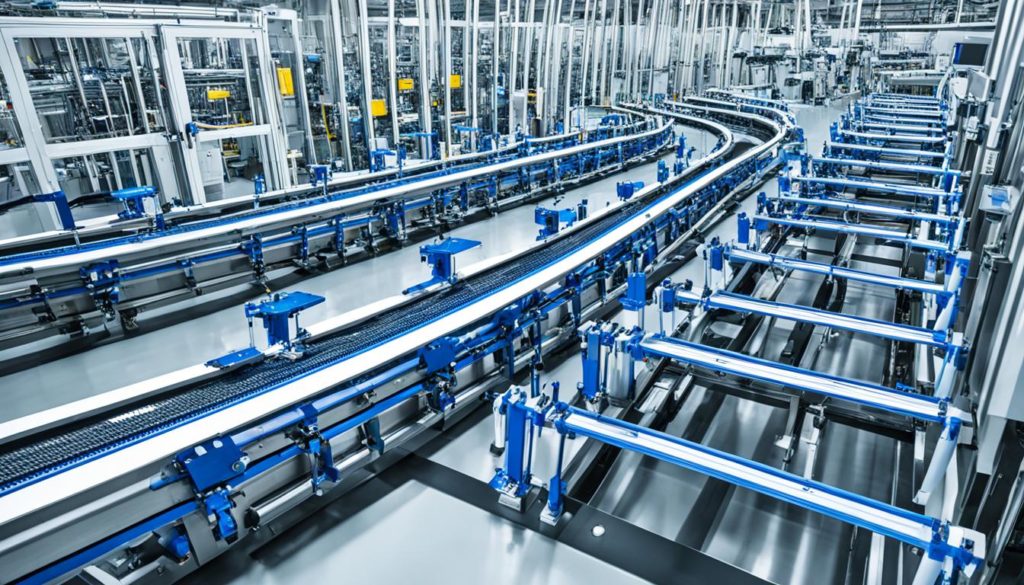
28% of recruiters struggle to find DevOps pros. This shows a high demand in a quick-growing area. As 2024 approaches, we must look at how DevOps trends fit into our workspaces. This will help businesses be more agile and quick to respond. The future of DevOps combines new technologies, changing both DevOps technology and its impact a lot.
We see a big change towards smart automation. It uses powerful tools like artificial intelligence, the Internet of Things, and quantum computing. These aren’t just small changes. They help products get to market faster, cut costs, and strengthen teamwork which is key to DevOps.
Key Takeaways
- Demand for DevOps skills is high, making it hard to find the right people.
- New DevOps trends merge culture, practices, and cutting-edge tech.
- AI and IoT are big influences on the future of DevOps.
- Serverless architectures and edge computing will change how we manage systems.
- Keeping up with continuous integration and delivery is vital for DevOps efficiency.
- A broad DevO pimps pact helps businesses run better and be more inventive.
The Integration of DevOps with Artificial Intelligence and Machine Learning
Today, the mix of AI in DevOps and machine learning and DevOps is vital. It’s not just a trend. These technologies are changing how we see DevOps and bringing big improvements in efficiency.
Automated Efficiencies: AI-Driven Predictive Analysis and Operations
More companies are using AI to spot problems before they slow down projects. AI tools find issues early, so teams can avoid troubles. This makes operations smoother and saves time and resources.
Enhancing Decision-Making: Machine Learning Models for DevOps Optimization
Machine learning helps by figuring out the best way to use resources. It improves performance and cuts down on waste. This blend of machine learning and DevOps makes teams smarter in their decisions.
Revolutionizing Testing: AI-Powered Automated Code Review and Testing Suites
AI is changing how testing is done in DevOps. More and more, AI testing tools are being adopted. They speed up code reviews and ensure software quality and reliability.
The aim is to move from traditional to modern, smart DevOps with AI and ML. Integrating these technologies leads to better efficiency and creativity. It’s about preparing for future innovations.
Want to learn more about AI and ML in DevOps? Check out detailed reports on LinkedIn.
Serverless Architectures and DevOps: A Future Without Infrastructure Constraints
Looking to the future, DevOps technology is changing a lot. The big change is the use of serverless architectures. This new method lets us improve DevOps strategies. Now, we don’t have to spend so much time and effort on managing servers and hardware. Instead, we can focus on making cool software solutions. This reduces the time and work needed to manage equipment.
The main benefit of serverless architectures is that they separate the server work from development. This makes infrastructure management easier. Costs and effort go down. Also, apps can be released faster. Using serverless means DevOps can offer better, scalable solutions quickly. These meet the changing needs of businesses well.
| Feature | Benefits | Impact on DevOps |
|---|---|---|
| Scalability | Automatic scaling to meet application demands | Less time spent on server capacity planning |
| Cost-Efficiency | Pay per use, no idle server costs | Reduction in overhead costs |
| Deployment Speed | Quick deployments and updates | Faster time-to-market |
| Maintenance | No servers to maintain | Focus shifts to quality of code |
By using serverless architectures more, DevOps strategies now focus more on being creative. This helps businesses stand out in a crowded market. With serverless, the future is about being creative and efficient. Now, digital growth is not held back by infrastructure, but driven by new ideas.
Containerization and Kubernetes: Cornerstones of DevOps Future
In the evolving world of DevOps, containerization and Kubernetes stand out. They redefine key DevOps trends. They change how we deploy software and manage systems. This shift boosts efficiency in organizations.
Kubernetes in DevOps: Streamlining Deployment and Scaling
Kubernetes is changing the DevOps game. It makes deploying and scaling simpler. This tool helps applications run well, no matter the size or complexity, speeding up deployment and improving reliability.
From Adoption to Adaptation: The Evolution of Containerization Practices
The move from just using containerization to fully embracing it is a big change in DevOps. With Kubernetes, managing containers becomes easier. This leads to a strong, flexible infrastructure that quickly adapts to new needs.
Creating Consistency Across Environments with Container Orchestration
Keeping deployments consistent across different environments is key. Container orchestration through Kubernetes is crucial here. It makes sure applications perform well, anywhere they’re deployed.
Adopting containerization and Kubernetes means more than following DevOps trends. It builds a foundation for a scalable, efficient, and consistent tech future. Their use in DevOps marks a shift towards flexible, adaptive operations, essential for today’s fast-changing digital scene.
Security as Code: The Emergence of DevSecOps
The rise of DevSecOps profoundly changes how we view security in the DevOps world by 2024. It signifies a time when security merges seamlessly into the development cycle. This blending enhances DevOps security practices, making security a core element throughout the application’s life.
Proactive Security Measures: Integrating SecOps into DevOps Workflows
Adopting proactive security is crucial. It’s a strategy that puts security first, right from the start of development. By doing this, security isn’t just an extra step—it’s foundational. Tools such as Snyk and SonarQube are key for early vulnerability detection, aiding a forward-thinking defense.
Shift-Left Security: Early Identification and Mitigation of Risks
The shift-left method focuses on catching security issues early. This not only boosts security but also cuts costs and saves time. Now, security is a team effort, involving everyone from developers to operations, creating a united security culture.
For more insight into DevSecOps’ future, check out this article.
The impact of DevSecOps on security practices is huge, making them more woven into DevOps actions. It promises a development space that is safer and more productive, where security and innovation go hand in hand.
The Influence of Edge Computing on DevOps Innovation
Businesses are always looking to get better and faster. The use of edge computing in DevOps is changing the game. It lets companies process data instantly, right where it’s created. This is key for things like analyzing data from IoT devices as it happens or reacting fast in self-driving cars.
- Enhanced Performance: Data is processed closer to where it’s created. This cuts down the delay in sending data to a central place. Faster decisions can be made, improving how apps work.
- Increased Security: Data is first handled locally. This lowers the risk when data is moved or stored far away. Better security and compliance come from this local approach.
- Operational Scalability: Being able to handle data in many places lets companies grow without big costs. This is a plus for firms in different countries worried about data laws.
Edge computing is reshaping what DevOps teams can do. It’s making them rethink networks and come up with new system designs. DevOps teams are becoming more agile and reliant on tech that allows quick decisions.
With ongoing innovation, edge computing will keep being key in DevOps. It’s guiding how businesses operate today.
Hybrid Cloud Strategies: Optimization of DevOps Workloads
Businesses are now embracing hybrid cloud environments more. They focus on DevOps strategies for workload optimization. Combining the scalability of public clouds with the security of private clouds is key. This mix is vital for handling data and meeting goals like data sovereignty and regulatory compliance.
Balancing On-Premise and Cloud Environments for Operational Efficiency
The main benefit of hybrid cloud strategies is their flexibility and increased efficiency. Companies can use on-premise solutions for sensitive tasks and the cloud for scalable needs. This balance is key for effective DevOps strategies, quick software updates, and a smooth IT experience.
Navigating Compliance and Data Sovereignty in Hybrid Cloud Models
With strict data laws worldwide, keeping data within specific borders is crucial. Hybrid clouds help meet these rules by storing sensitive data locally and using cloud resources for scale. Tools like VMware Cloud and AWS Outposts help manage hybrid cloud setups securely and within compliance.
Empathy and Culture: The Human Aspect of DevOps
In the evolving world of DevOps culture, a big change is happening. We are starting to focus on empathy in DevOps. This is not only about doing our technical jobs better. It’s also about creating a place where everyone feels important and understood. This approach is key to working well together because it welcomes different ideas with open arms.
When we bring empathy into DevOps teams, we see better teamwork and success in projects. It’s about making strong connections and supporting each other. This doesn’t just help us reach our tech goals. It also looks after our well-being.
- Building a supportive framework to encourage shared goals
- Amplifying communication to ensure clear and open dialogue
- Valuing contributions from all team members to boost morale and productivity
Adding empathy to our culture changes how teams work together. It also keeps us competitive by embracing DevOps trends. By focusing on people, we adapt faster, innovate more, and stay ahead in the tech world.
| Aspect | Impact on DevOps Culture | Benefits |
|---|---|---|
| Empathy | Drives stronger collaboration and communication | Enhanced team dynamics and project success |
| Cultural Nurturing | Encourages a welcoming, inclusive environment | Promotes innovation and adaptability within teams |
| Understanding Perspectives | Helps in addressing and solving challenges cooperatively | Leads to more effective solutions and reduced conflicts |
Looking ahead, making empathy and a caring culture part of DevOps is crucial. It’s not just good for business. It’s necessary for success that lasts. By valuing these human elements, we not only improve our tech. We also create a strong, flexible culture in our organization.
Conclusion: Embracing the Evolution of DevOps
As we move forward, the world of DevOps is changing quickly. We need to keep up with its fast pace. DevOps brings together development, operations, and quality assurance in a powerful way. It has made shorter development times, reliable releases, and solving problems quickly the standard. This change is about more than keeping up. It’s about getting ahead by using AI, ML, and serverless tech in our work methods. We’re part of an ongoing change, aiming for constant betterment.
The move to platform engineering offers a chance to grow and stay strong in today’s tech world. Our platform engineers lead this change. They combine software development with solid infrastructure handling. They also manage complex system operations. Through their skills, we build self-operating infrastructures and design systems for the best service checks. This helps us automate our processes, a key strategy for full DevOps integration.
We’re excited about the future of innovations. These prospects drive our push for greatness. As DevOps evolves, we’re not just adopting new techniques. We’re also adopting a culture of adaptability and forward planning. When thinking about DevOps predictions, we aim to stay ahead of the curve. Our goal is to not only meet but surpass excellence in operations. We are committed to showing the powerful impact of DevOps in today’s fast-growing tech scene.
FAQ
What are the upcoming DevOps trends impacting software delivery and operational efficiency?
The latest DevOps trends focus on AI and IoT. They lead to smarter management and serverless computing. Security and empathy in teams are also key.
How are artificial intelligence and machine learning integrating with DevOps?
AI and ML make DevOps smarter by offering predictive analytics and optimization. They also provide automated code reviews and testing to boost efficiency.
Why is serverless architecture becoming a significant aspect of DevOps?
Serverless architecture lets DevOps focus more on writing code. It cuts down on server management tasks. This helps deliver software solutions faster.
What role will Kubernetes and containerization play in the future of DevOps?
Kubernetes and containerization are becoming crucial for DevOps. Kubernetes makes deploying containers easier. This is vital for efficient microservices deployment and consistency across different environments.
What is DevSecOps and why is it important for the future of DevOps?
DevSecOps brings security into every software development phase. It focuses on early security measures. This ensures a development cycle that is secure from the start.
How will edge computing influence DevOps innovation?
Edge computing is key for DevOps in delivering instant data processing. This is vital for IoT and needs for quick action. It improves performance and security.
In what ways do hybrid cloud environments optimize DevOps workloads?
Hybrid clouds mix public cloud flexibility with private cloud security. This optimizes DevOps processes. It also fits data rules and regulations.
Why is empathy and a collaborative culture important in DevOps?
Empathy and teamwork are vital in DevOps. They ensure a culture where different views are valued. This boosts communication, teamwork, and innovation.
How can embracing the evolution of DevOps provide a competitive advantage?
Adopting new DevOps trends like AI, ML, and serverless computing leads to improvements. It gives firms an edge through better services and operational efficiency.
Future App Studios is an award-winning software development & outsourcing company. Our team of experts is ready to craft the solution your company needs.










